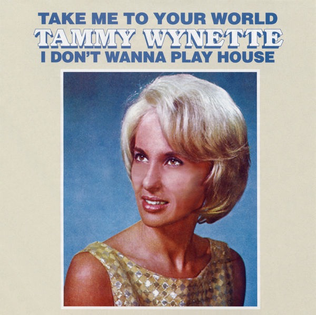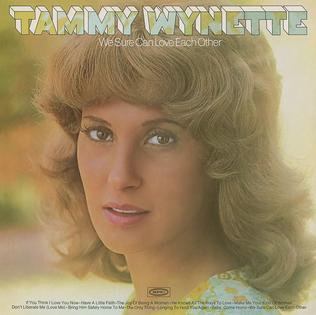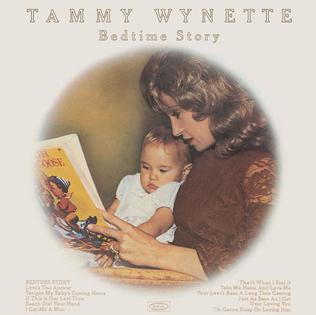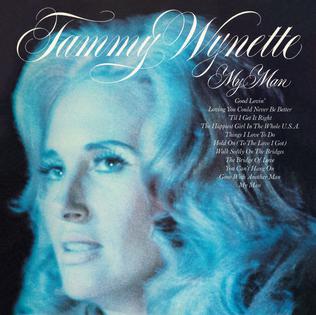Related Research Articles

"Since I Don't Have You" is a song written and composed by Jackie Taylor, James Beaumont, Janet Vogel, Joseph Rock, Joe Verscharen, Lennie Martin, and Wally Lester. It was first a 1958 hit single for the doo-wop group the Skyliners on the Billboard Hot 100. Country music singer Ronnie Milsap had a hit with the song in 1991. American hard rock band Guns N' Roses also had some success in 1994 with their version of the song which reached the top 10 on the UK Singles Chart.
"Sweet Dreams" or "Sweet Dreams (of You)" is a country ballad, which was written by Don Gibson. Gibson originally recorded the song in 1955; his version hit the top ten of Billboard's country chart, but was eclipsed by the success of a competing recording by Faron Young. In 1960, after Gibson had established himself as a country music superstar, he released a new take as a single. This version also charted in the top ten on the country chart and also crossed over to the Billboard Hot 100, where it peaked at No.93. The song has become a country standard, with other notable versions by Patsy Cline and Emmylou Harris.

"Just to Hear You Say That You Love Me" is a song written by Diane Warren and recorded by pop singer Chynna Phillips for her solo debut album, Naked and Sacred, released in 1995. The song was released as the fourth and final single from the album, and peaked at number 64 in Australia in February 1997.
Tammy Wynette Graham is an American country music artist. Active as a singer and self-taught pianist since childhood, she first gained attention in her hometown before moving to Las Vegas and subsequently to Nashville, where she was signed to a recording contract with a division of Arista Nashville in 1997, releasing a studio album and charting three singles on the Billboard country music charts that year, including the No. 37-peaking "A Dozen Red Roses".

Paper Roses is a studio album by American singer Marie Osmond. It was released in September 1973 in conjunction with MGM Records and Kolob Records. Paper Roses was the debut studio album in Osmond's career and its title track was released as her debut single. The song topped the US and Canadian country charts. It also crossed over onto both the US, Canadian and UK pop charts upon its release. The album itself also topped the US country charts, while also reaching chart positions in Canada and the United Kingdom. An additional nine tracks were included on the album, many of which were covers of previously recorded country songs.

Your Good Girl's Gonna Go Bad is a studio album by American country artist Tammy Wynette. It was released in May 1967 and contained ten tracks. The majority of the album was a collection of cover tunes Wynette recorded, including songs by George Jones, Loretta Lynn and Jeannie Seely. Several new songs were also part of the project. It was the debut studio album of Wynette's career and included two singles: "Apartment No. 9" and "Your Good Girl's Gonna Go Bad". The latter became Wynette's first chart success, climbing into the top five of the American country chart. The album itself reached the American country LP's chart in 1967. The album later received a positive review from AllMusic, which gave it a five-star rating.

Take Me to Your World / I Don't Wanna Play House is a studio album by American country artist Tammy Wynette. It was released in January 1968 via Epic Records and contained 11 tracks. It was the third studio album of Wynette's career. The album featured several new recordings as well as covers of previously-recorded material. Among the new recordings were two singles, which both topped the American country chart: "I Don't Wanna Play House" and "Take Me to Your World". The album itself reached the top five of the American country LP's chart in 1968. It received positive reviews from several publications following its release.

D-I-V-O-R-C-E is a studio album by American country artist Tammy Wynette. It was released in July 1968 via Epic Records and contained 11 tracks. Several recordings were cover tunes, including songs by Merle Haggard and The Beatles. Several new selections were also part of the collection, including the title track. Released as a single, the title track became Wynette's fourth number one song on the North American country charts in 1968. The album itself would also top the American country LP's chart in 1968. D-I-V-O-R-C-E received positive reviews from critics following its release.

"A Little Gasoline" is a song written by Dean Miller and Tammy Rogers, and recorded by Canadian country music artist Terri Clark. It was released in July 2000 as the first single from her album Fearless. The song reached number 9 on the RPM Country Tracks chart in September 2000 and number 13 on the Billboard Hot Country Singles & Tracks chart.
"Rose Garden" is a song written in 1967 by American singer-songwriter Joe South. It was first recorded by Billy Joe Royal on his 1967 studio album Billy Joe Royal Featuring "Hush". Versions by South himself and Dobie Gray appeared shortly after the original. Gray's version became a minor hit in North America in 1969.
"Woman to Woman" is a song written by Billy Sherrill, and recorded by American country music artist Tammy Wynette. It was released in July 1974 as the only single from her album of the same name. The song peaked at number 4 on the Billboard Hot Country Singles chart. It also reached number 1 on the RPM Country Tracks chart in Canada.
"Never Again, Again" is a song written by Monty Holmes and Barbie Isham, and performed by American country music singer Lee Ann Womack. It was released as Womack's debut record in March 1997 on Decca Nashville and was later included in her 1997 album Lee Ann Womack. The single began Womack's career. It peaked at number 23 on the U.S. Billboard Hot Country Singles & Tracks chart.

The Ways to Love a Man is a studio album by American country artist, Tammy Wynette. It was released on January 26, 1970, via Epic Records and was the seventh studio album in Wynette's career. The disc consisted of 11 tracks which included both original material and cover recordings. Its title track was the album's only single included. It became a number one song on the North American country charts while also reaching chart positions in other musical genres as well. The album itself also reached chart positions on the country albums chart following its release. Critics and journalists gave the album a positive reception in the years that followed.

Tammy's Touch is a studio album by American country artist, Tammy Wynette. It was released on April 27, 1970 via Epic Records and contained 11 tracks. The album's material centered around themes of heartbreak and romance. Many of the album's songs were new recordings while others were covers. Among its new recordings was the singles "I'll See Him Through" and "He Loves Me All the Way". Both songs became chart-topping tracks on the country music charts in 1970. The album itself also reached top positions on multiple charts in the United States.

We Sure Can Love Each Other is a studio album by American country artist, Tammy Wynette. It was released on May 3, 1971 via Epic Records and was the eleventh studio album released in her career. The disc contained a total of 11 tracks, mixing new material with cover tunes. The title track was the only singles included and became a chart-topping country song in North America. The album itself also charted in the top ten of the American country albums chart and received positive reviews by critics.

Bedtime Story is a studio album by American country artist, Tammy Wynette. It was released in March 1972 via Epic Records and contained 11 tracks. The disc featured both new recordings and cover tunes. Two singles were included: title track and "Reach Out Your Hand". Both made top positions on the North American country charts in 1972. The album itself reached the top ten of the American country albums chart following its release.

My Man is a studio album by American country artist, Tammy Wynette. It was released on September 25, 1972 via Epic Records and was the fifteenth studio album of her career. The disc was a collection of 11 tracks whose themes centered around spousal loyalty and heartache. Two singles were spawned from the album: "My Man (Understands)" and "'Til I Get It Right". Both topped the country charts in 1972 and 1973, respectively. The album itself reached the top position on the American country albums chart.

The singles discography of American country musician Tammy Wynette contains 65 singles, 6 music videos, 3 promotional singles and 2 featured singles. Wynette signed with Epic Records in 1966 and her debut single "Apartment No. 9" was released the same year. Her single "Your Good Girl's Gonna Go Bad" (1967) became a major hit, reaching number 3 on the Billboard Hot Country Singles chart. Its follow-up singles: "My Elusive Dreams", "I Don't Wanna Play House", "Take Me to Your World" and "D-I-V-O-R-C-E", became number 1 hits on the Hot Country Singles chart.

Tammy's Greatest Hits, Volume II is a compilation album by American country artist, Tammy Wynette. It was released on September 6, 1971 via Epic Records and featured 11 tracks. A majority of the album compiled previously-released singles from the late sixties and early seventies. Some tracks were new material, including "Good Lovin' ". Released as the disc's lead single, it topped the country charts in 1971. The album itself reached the top five of the American country LP's chart in 1971 and later certified gold in the United States.

Kids Say the Darndest Things is a compilation album by American country artist, Tammy Wynette. It was released on April 23, 1973, via Epic Records and contained 11 tracks. The disc was a concept album centering around children and domestic life. The title track was the lead single from the album and topped the country charts in 1973. The album itself also made the American country albums chart. It received positive reviews from critics.
References
- ↑ Whitburn, Joel (2013). Hot Country Songs: 1944–2012, Eighth edition. Record Research. p. 135.
- ↑ "A Dozen Red Roses". Allmusic. Retrieved 22 July 2017.
- ↑ "Reviews". Billboard. March 29, 1997. p. 75.
- ↑ "Tammy Graham Chart History (Hot Country Songs)". Billboard.
- ↑ "Tammy Graham Chart History (Bubbling Under Hot 100)". Billboard.
- ↑ "RPM Country Tracks for June 23, 1997". RPM. June 23, 1997. Retrieved 22 July 2017.